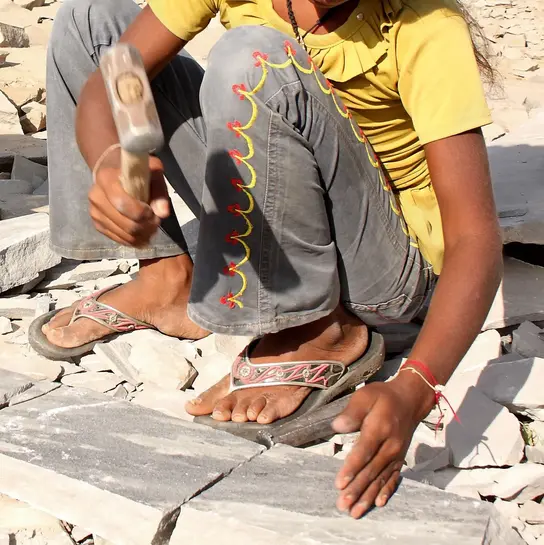Consumption without child labor:
natural stones
Natural stone is ubiquitous: as tiles in bathrooms and countertops in kitchens, as paving on patios and in pedestrian zones, and as gravestones in cemeteries. Over one million tons of stone – granite, sandstone, limestone, marble, or slate – are used in construction in Germany alone each year. Around 80 percent of natural stone comes from India and China, the world's two largest producers of natural stone.
Child labor in quarries is one of the worst forms of child labor and is prohibited in all countries of the world for children and young people under 18. Nevertheless, in India, for example, girls and boys toil primarily in the countless illegal and unregistered small quarries or in the processing of the stone. This stone is then sold to large companies that supply the global market.
Children chip stones in the scorching heat or break larger blocks by hand. The risk of accidents from falling stones, falls, or sharp and excessively heavy tools is very high. Children, like adults, inhale stone dust, which causes the deadly pneumoconiosis known as silicosis. The life expectancy of workers in quarries in Rajasthan, India, is around 40 years.
Further problems with natural stone extraction:
Even in legal quarries, compliance with basic labor rights and occupational safety is inadequate in many countries. Civil society organizations repeatedly report numerous accidental deaths and debt bondage in Indian quarries, for example. Displacement of local residents and damage to their livelihoods are also reported from all parts of the world, such as through deforestation or the dumping of unwanted stones or dust on agricultural land. Quarries sometimes destroy entire landscapes and can alter a region's water balance. Biodiversity declines. Natural stones are durable, but transporting them by ship halfway around the world generates additional CO₂ emissions. Abandoned quarries can provide habitats for specialized species.
Alternatives for consumers
Public authorities are particularly responsible for the fair procurement of natural stone. Since 2009, cities and municipalities have been able to include social and environmental criteria in their tenders. For example, for paving squares or pedestrian zones, constructing kindergartens and schools, or other public buildings, cities and municipalities can include the prohibition of child labor and adherence to fundamental labor rights in their tenders. But there are also alternatives for private consumers:
Fair Stone
Fair Stone certifies and continuously monitors quarries, primarily in China, Vietnam, and India. Natural stones bear the Fair Stone seal if:
- The stone importers must submit a guarantee declaration from their suppliers
- Basic labor rights, such as the prohibition of child and forced labor, must be respected in the quarries and processing plants
- At least the statutory minimum wages must be paid
- Health and safety measures are implemented
- The companies undergo a comprehensive review after the conversion phase has ended
Fairstone has been recognized by the state government of North Rhine-Westphalia as a certification body for gravestones. In North Rhine-Westphalia and Lower Saxony, municipalities can amend their cemetery regulations to stipulate that only gravestones produced without child labor may be erected. Dealers and further information: www.fairstone.org
Xertifix
The Xertifix association is a coalition of action groups from the IG BAU trade union and stonemasons. The Xertifix standard requires adherence to fundamental labor rights, including the prohibition of child labor and slavery, the payment of legally mandated minimum wages, and compliance with health and safety regulations. Quarries and processing plants in India, China, and Vietnam are inspected twice a year.


